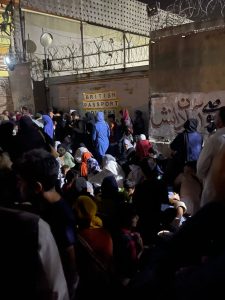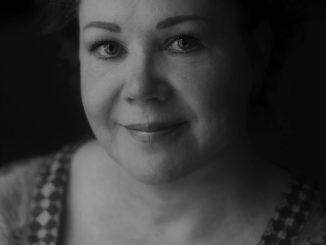LIKE LOTS OF children, Larisa Brown loved writing little stories, and thought it would be amazing to become an author one day. However, she was realistic enough to realise this might be something of a pipe dream.
But in fact, Caversham resident Larisa has achieved her ambition, with her gripping account of one family’s escape from Afghanistan following the end of the NATO engagement in August 2021. The Gardener of Lashkar Gar, (reviewed right) published by Bloomsbury in August with a book launch at Fourbears Bookshop in Caversham, was the product of Larisa’s campaigning work while she was Defence Correspondent at the Daily Mail, and currently, as Defence Editor of The Times.
I never had any particular idea about what I wanted to do, however I was always very interested in history and in war. Having grown up in Preston, I went to study History and Politics at Newcastle University. While there I got involved with the student newspaper, which inspired me to get involved in journalism. Someone told me about an internship in Kenya, so I went out there and worked on KenyaKidz. After that, I joined the Daily Mail graduate scheme, which gave me lots of experience, and I moved around doing various jobs, staying with them for ten years.
“In 2014 they offered me the Defence Correspondent job – I became the first female to take this on. I had always admired journalists such as Kate Adie and John Simpson, so I jumped at the chance. And in October 2014, a few weeks after starting the job, I found myself going out to Helmand in Afghanistan, joining British troops in the ‘packing-up op’ and being with them on the last flight out of Helmand.
“It was incredible to be there at this moment, it was very emotional. It really didn’t feel as though it was ‘mission accomplished’, although they were calling it the end. At the time, I had no idea about the situation regarding the Afghan interpreters who would be vulnerable to extreme reprisals once the troops left. A year later, my journalist colleague David Williams heard about an interpreter called Popal who had been executed by the Taliban, and we wrote a news story about this in the paper. The Daily Mail’s editor Paul Dacre was appalled and decided to launch a campaign to highlight their plight,” Larisa explained.
Larisa and David began to publicise the cases they unearthed; however they were frustrated at the lack of any interest in the government – and without a change in policy, Afghan nationals who had worked for British troops would be trapped. But finally the power of the press campaign produced results. “Eventually, Gavin Williamson, then Ben Wallace began to change government policies in recognition of the Afghans’ plight,” Larisa said. “As a former member of the Scots Guards, Ben Wallace understood – in talking to soldiers, they would all tell me how important the Afghan interpreters were.”
 The Daily Mail campaign was known as Betrayal of the Brave, and Larisa and David’s work won Campaign of the Year at the British Journalism Awards in 2018. However, government policy in allowing interpreters to enter the UK only very slowly relaxed, so the two journalists continued to highlight the situation, which was becoming increasingly grim not only for the interpreters but also for their families, under increasing threat as the Taliban returned. Although President Biden gave notice that the US would withdraw from Afghanistan in August 2021, no prior plans were made by the UK government to evacuate vulnerable Afghans, resulting in the chaotic and traumatic events at Kabul airport which forms the climax of Larisa’s book. At present Larisa is on maternity leave from the Times (first time mother to twin boys!) but she is still in touch with the situation and filing stories.
The Daily Mail campaign was known as Betrayal of the Brave, and Larisa and David’s work won Campaign of the Year at the British Journalism Awards in 2018. However, government policy in allowing interpreters to enter the UK only very slowly relaxed, so the two journalists continued to highlight the situation, which was becoming increasingly grim not only for the interpreters but also for their families, under increasing threat as the Taliban returned. Although President Biden gave notice that the US would withdraw from Afghanistan in August 2021, no prior plans were made by the UK government to evacuate vulnerable Afghans, resulting in the chaotic and traumatic events at Kabul airport which forms the climax of Larisa’s book. At present Larisa is on maternity leave from the Times (first time mother to twin boys!) but she is still in touch with the situation and filing stories.
“For example, there is the case of Sajid, who was able to enter the UK with his wife. His son, now three, stayed behind in Afghanistan with grandparents. Sajid recently applied for his child to join them – but the Home Office decided that Sajid didn’t earn enough as a taxi driver to care for the child, so I filed a story in the Times about his case,” Larisa revealed. Being able to influence political decisions which have a profound impact on people’s lives has become a driving force for Larisa, who believes strongly that well-researched, accountable journalism has an important place in shaping public opinion and ultimately governance.
 “After his story appeared in The Times, Sajid wrote to me, ‘The Home Office have now overturned their decision. We thank you from the bottom of our hearts.’ I still get lots of people contacting me, and some have come to my house to meet my twins. One man said I had helped him because I had sent him a map which helped him reach the right gate at the airport – he called me ‘My distinguished life saver!’
“After his story appeared in The Times, Sajid wrote to me, ‘The Home Office have now overturned their decision. We thank you from the bottom of our hearts.’ I still get lots of people contacting me, and some have come to my house to meet my twins. One man said I had helped him because I had sent him a map which helped him reach the right gate at the airport – he called me ‘My distinguished life saver!’
“As a journalist,” she concluded, “I believe you have a moral duty to help those you can.”



